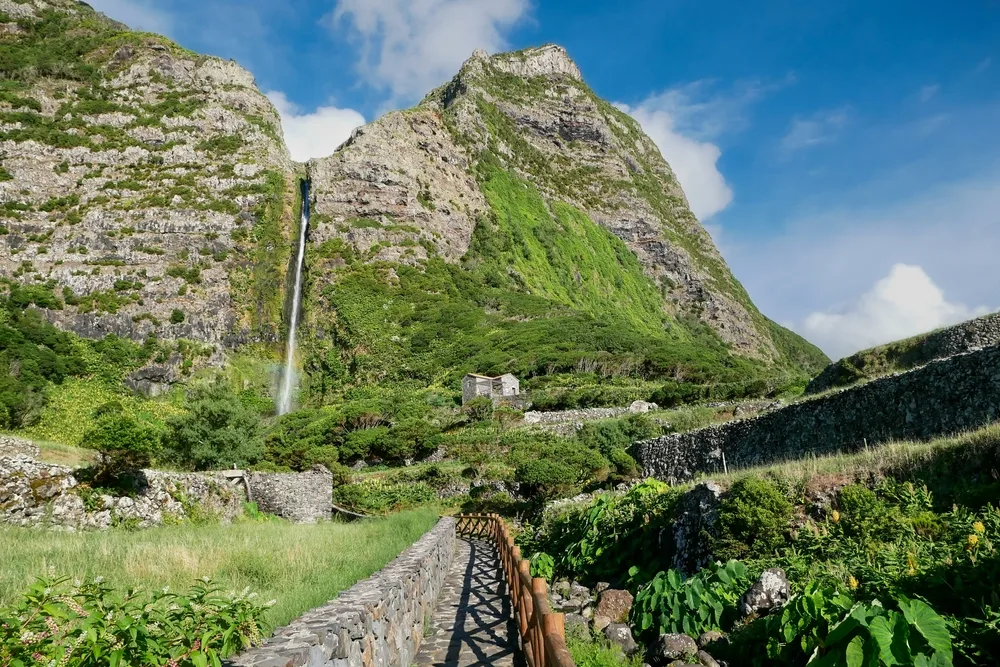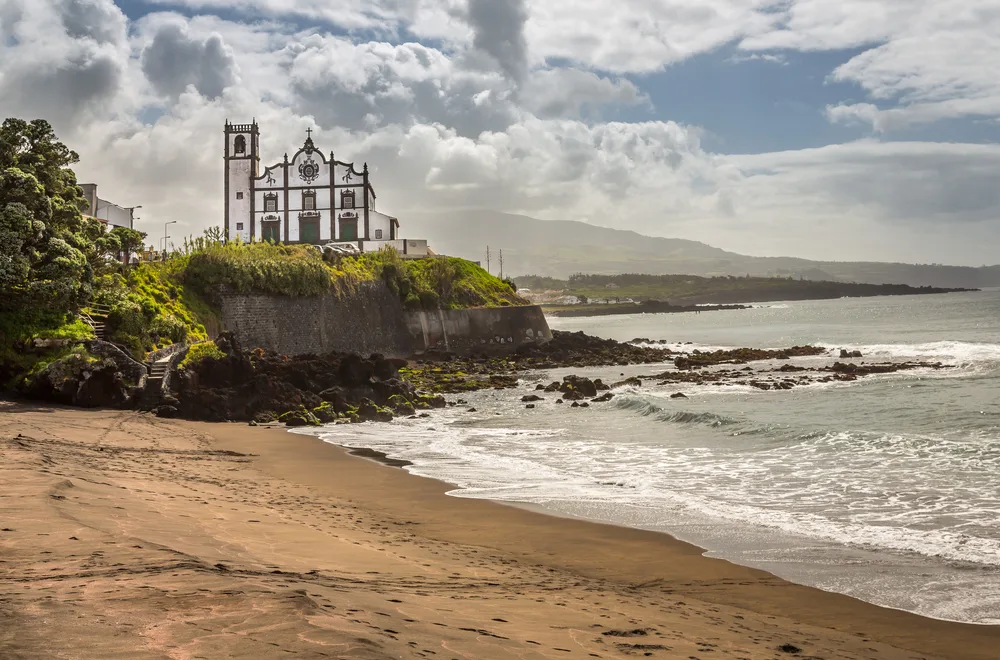The Azores Islands in the Atlantic Ocean are an oasis of wild nature that feel as if they are an entire world away from mainland Portugal.
They are a popular destination for those in search of a unique vacation, attracting around 645,000 visitors a year. The primary draw in visiting is the beautiful nature that you can find on the islands.
After all, the islands are a popular hotspot for whales, and whale watching is one of the most popular activities that you can do on the island. You can also go hiking in Sete Cidades or Lagoa do Fogo.
If you want a more relaxed pace for your vacation, take a dip in the hot springs, go wine tasting, or stay in an authentic fishing village. The Azores are a perfect destination for a vacation that feels like stepping back in time as well as traveling to a far-away location.
However, you might be wondering if they are safe to visit. It’s always a good idea to research the safety of a new destination before traveling there, which is why we put together this detailed guide to safety in the Azores.
Keep reading for more information about everything that you need to know, including crime. Let us be your guide!
Are the Azores Safe to Visit in 2025?

Loredana Habermann/Shutterstock
Yes. The Azores are a very safe place to visit! The crime rate is low, so low that it is practically nonexistent.
While you should be careful when engaging in outdoor activities, the same way that you would anywhere else, you don’t have to worry much about anything bad happening to you while you are on the islands.
The Azores are an extremely safe place to visit. In fact, in 2021, the Azores were voted one of the safest places to visit in Europe! Even during the COVID-19 pandemic, the Azores were a safe place to visit thanks to strict protocols that protected locals and visitors.
Now that the pandemic has officially been declared over, the Azores are safer than ever. The Canadian government has a travel advisory specifically for the islands that declares them very safe to visit.
However, you still might encounter some petty crimes such as:
- Pickpocketing
- Bag snatching
- Verbal harassment
It helps that the country of Portugal overall is very safe. The Australian government only tells its citizens to exercise normal safety precautions when visiting Portugal, since they are only at risk of petty theft.
The Azores, as the remotest, quietest region of an already safe country, are logically going to be very safe. Instead of worrying about crime, you should read up on natural disasters and how to stay safe in nature before visiting the Azores.
The same rugged landscapes that attract tourists also hide potential dangers. The Azores are prone to some natural disasters. The same tectonic activity that made the islands so beautiful sometimes has negative consequences.
In the Australian travel advisory mentioned above, the government specifies that the Azores are prone to earthquakes. In 2022, the islands were rattled by a series of minor tremors that made many locals fear that a bigger earthquake was on the way.
The Azores are also home to several active volcanoes, although they usually don’t have explosive eruptions. Make sure you follow local news and any evacuation notices while you are in town.
When getting out into nature in the Azores, it’s a good idea to use precautions to protect yourself from any accidents. Nature is unpredictable, and you never know what might happen.
The weather is rainy, even in the summer, so dress in layers. When you go hiking, make sure you pick trails that match your skill level and always tell somebody else where you are.
The Azores are in the middle of the Atlantic Ocean, which means that the water around the island is very choppy. Swimming is not safe on many beaches.
Portugal has an extensive flag system for rating the safety of different beaches, so be sure to follow all posted warnings. After all, several people have drowned on Portugal’s beaches before.
Another thing to consider is that whale watching and other adventure tours are popular in the Azores.
Most tour operators are regulated by the Portuguese government, but make sure that you check ahead of time and do your research. You don’t want to trust your safety to a tour operator with lax operations.
Crime in the Azores

DaLiu/Shutterstock
Crime rates in the Azores are barely worth a mention, they are so low. In terms of protecting your safety, you have far more to worry about from natural disasters or accidents while out hiking than from crime. Still, it doesn’t hurt to be careful when you can.
You don’t have to worry much about crime in the Azores as crime rates are very low. In fact, according to some metrics, the Azores are one of the regions with the lowest crime rates in Portugal.
The site Numbeo has crime data for Ponta Delgada, the largest municipality in the Azores, that proves this point. The crime index for the area is just 10.75 out of 100, a very low value.
People are not concerned at all about most crimes. They only report slightly elevated concerns about theft from vehicles and vandalism. Of course, the Azores are not perfect, and like any place on Earth, they have problems.
According to Numbeo, locals are worried about an increase in drug abuse rates on the island. A shipwreck led to a cocaine epidemic on the island, causing many locals to worry about society becoming destabilized.
Locals are also concerned about increases in crime. According to crime statistics from the Portuguese government, violent crime in the Azores increased by 4% in 2022.
However, overall crime decreased by 2.6%, the only region in Portugal to experience a decrease in crime that year. It’s also important to put this reported increase in crime into context.
An increase in violent crime means that for the entire year, the Azores experienced 232 violent crimes. There may have been a slight increase, but overall, crime rates in the Azores remain very low.
Pickpocketing
Crime rates in the Azores are very, very low. This includes crimes that are common at popular tourist destinations worldwide, such as pickpocketing and bag snatching.
However, that doesn’t mean that pickpocketing doesn’t happen. You are most likely to encounter this type of crime when you are in one of the more populous areas of the Azores such as Horta, Ponta Delgada, and Sao Miguel.
Pickpockets on the Azores know that they will have more luck in places with plenty of tourist arrivals and more crowds to hide their activities.
Since crime is so rare in the Azores, basic precautions are usually enough to deter local pickpockets. Make sure that you don’t leave your valuables unattended.
That’s good advice to follow anywhere as you never know who might be waiting for a moment of inattention. Even in a restaurant or hotel lobby, make sure that your bag and passport are always in sight.
Petty theft sometimes happens on beaches. When you go swimming, surfing, or diving, never leave your things just unattended on the beach.
Designate someone from your group to stay on the shore and watch your possessions, or leave your valuables locked up in your hotel safe. Most crimes on the Azores are crimes of opportunity, so as long as you don’t give criminals the opportunity, you should be safe.
You don’t have to take extra precautions such as wearing a money belt or hiding money in your shoe. Basic situational awareness is enough to deter most crime in the Azores.
Theft From Vehicles
If you are looking to get out into nature, renting a car is one of the best ways to do so in the Azores. Public transportation on the islands is not that developed, and most popular attractions are in remote areas.
Renting a car makes you vulnerable to one of the most common crimes on the island and that is theft from vehicles. According to the Numbeo report mentioned above, theft from vehicles is one of the most common crimes that people on the Azores worry about.
This is a crime that affects locals and visitors alike. Most thefts occur in bigger towns on the Azores, but you should also be careful when you park elsewhere.
Thieves sometimes frequent trailheads and marina areas popular with tourists since they know that people who park there won’t be back for a while.
As with pickpocketing, basic precautions are enough to deter most thieves interested in theft from vehicles. Don’t leave possessions visible in your car — if you are driving around with your luggage due to hotel check-in times, put luggage in the trunk and don’t open the trunk when you park.
ake anything that you really can’t afford to lose, such as your wallet, phone, and ID, with you every time you leave the car.
Avoiding Bad Areas

ANGRA DO HEROISMO, PORTUGAL – 04 MARCH, 2023: City of Angra do Heroismo. Historic fortified city and the capital of the Portuguese island of Terceira in the Autonomous Region of the Azores/Curioso.Photography/Shutterstock
There are really no particularly parts of the Azores that are dangerous. As we said earlier, crime everywhere on the islands is very low.
However, keep in mind that most areas of the Azores have a low population density and not many street lights. Although crime is fairly low, you may not feel very comfortable walking around alone after dark.
Things to Consider
Here are a few safety tips for visiting the Azores:
- Currents and riptides are very strong. Practice water safety when going out swimming. Avoid beaches that are at river mouths as those have the strongest currents. Pay attention to posted flag warnings and weather alerts. Don’t go swimming when there is a storm alert.
- Walking along the beach can also be a hazard. In the winter, don’t walk too close to the edge as waves are strong enough to pull people on the shore in, due to the undertow. The strong weather and waves erode the shoreline, so follow posted cliff erosion signs. Daredevils not only risk their lives, but might get a government fine.
- Be careful when driving. Renting a car is the best way to see the islands, but keep in mind that roads are narrow and sometimes poorly maintained in rural areas. Drive slowly to be mindful of sharp curves, potholes, and wandering cows.
Frequently Asked Questions

Paulo Miguel Costa/Shutterstock
Here are some other questions you might have before visiting the Azores:
Is it safe to travel to the Azores with the earthquakes?
Natural disasters are possible in the Azores, including earthquakes. Most earthquakes are small tremors, but there have been devastating earthquakes in the past. Read up on earthquake preparedness tips before traveling to the Azores.
Research if scientists are saying there is a likelihood of a strong earthquake before you go. This is important, as you’ll typically know about a pending earthquake ahead of time.
Is it safe to swim in the Azores?
The Azores have very strong currents and waves since they are in the middle of the ocean. Swimming in the Azores is only for strong swimmers. Even then, be sure to follow posted flag warnings and don’t swim if there is a red flag.
Are the Azores affordable or expensive?
Traveling to the Azores is more expensive than traveling to mainland Portugal because transportation to the archipelago and between the different islands is pricey.
Plus, the islands have to import many goods, increasing their cost. However, the Azores are affordable when compared to other European destinations.
Is it worth going to the Azores?
If you love nature, then going to the Azores is worth it. The volcanic landscapes are like no other place, and the whale watching opportunities are better than ever.
Do the Azores get tsunamis?
Due to their location in the open ocean, the Azores are vulnerable to tsunamis. However, these events mostly occur when there is seismic activity elsewhere in the Atlantic.
So, Should You Visit the Azores?
If you are looking for a safe getaway into nature, a visit to the Azores is one of the best choices that you can make. The crime rate on the archipelago is very low, and you just have to be careful of the rough weather and rougher seas. Happy travels!



